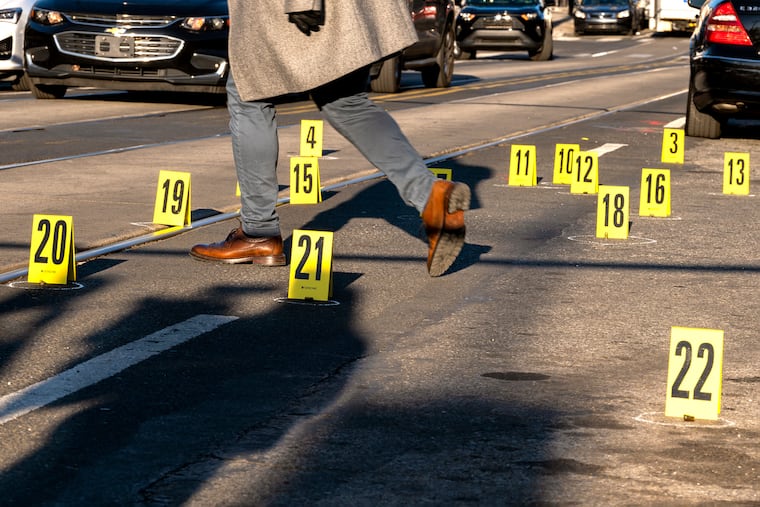Our stories are one of the strongest forms of resistance to Trump’s fascist assault
While Donald Trump attempts to silence the most marginalized among us, the Philadelphia Obituary Project helps to share the stories of those who refuse to be silenced.

Around the time the Trump administration was busy erasing websites of government agencies — including the Office of Gun Violence Prevention just before a deadly school shooting in Tennessee — I got an email about the Philadelphia Obituary Project launching a writing program to help loved ones of victims to tell their own stories.
The nonprofit’s program wasn’t in reaction to the administration’s erasure. It has long honored people who’ve lost their lives to guns — but the coincidental timing highlighted two truths: Trump’s diabolical attempts to silence our most marginalized voices, and the relentless resilience of those who refuse to be silenced.
The Office of Gun Violence Prevention, established in 2023 by President Joe Biden to address mass shootings and community violence, helped implement the landmark Bipartisan Safer Communities Act. But days before Trump’s inauguration, its staff resigned, and its website now redirects to a 404 error.
Despite this, former leaders of the office struck a surprisingly optimistic tone with the Trace, a news site focused on guns and gun violence in America. Their work, one of the directors said, can help inform prioritizing gun violence in the future — even while recognizing that the momentum against gun violence will likely come from outside the White House.
On that point, I agree, and that goes for everything currently under attack by this administration, including reproductive, transgender, and immigrant rights. Too many politicians have shown little will, and even less ability, to fight the increasingly disturbing actions coming out of Washington. One example right here in Philadelphia is the Immigration and Customs Enforcement (ICE) raid at a North Philadelphia car wash last week, where the arrests of seven men, most of whom had been in the United States for years, were met with deafening silence from City Hall. “Where is the mayor?” the Rev. Hannah Capaldi, of the Unitarian Society at Germantown, asked at a protest after the arrests. “Where is City Council? Where’s the statement? Where’s the news conference?”
The news conference, at least, finally came on Friday, with many city leaders pledging a united “show of force.” Mayor Cherelle L. Parker, however, wasn’t among them.
I’ve spent much of my career amplifying the voices of marginalized people, including gun violence victims, grateful for a platform to help share their stories, hopeful it’s made some small difference. But make no mistake, these stories have always been there — told and retold by those most directly impacted, regardless of our attention or inattention — as has the ongoing work on the ground.
So while the erasure of the websites and closure of vital offices is, by design, chaotic and confusing, what I also know for sure is this: It won’t stop the stories from being told. And it won’t stop the work.
It will get harder, and that, as is the fear and cruelty that drives this administration, is the point. But it won’t end.
History — something else Donald Trump and his supporters are desperately trying to whitewash — has taught us that, and as such we have to wield the power of storytelling as we navigate this dark moment in our history.
(This is where I admit that there have been times, in the last few weeks especially, where my faith in storytelling has sometimes wavered — what have the thousands of words of warning so far amounted to? But I return, always, to my long-held belief in the power of stories to help create a more just world.)
The Philadelphia Obituary Project’s new program is called “Writing Heals,” and families will be paid to tell their own stories about victims who are too often forgotten — and are in danger of being so again as the world is pulled in countless chaotic directions.
Helping to lead the project is Kimberly Kamara, who lost her youngest child and only son, 23-year-old Niam Johnson-Tate, to gun violence in 2017.
Kamara, who lives in Germantown, has been sharing her story for years — with fellow victims, with lawmakers and journalists, in a column she writes for the Philadelphia Obituary Project, and with anyone who will listen to the agonizing and endless pain of an epidemic that cannot be erased by political cowardice.
In 2019, she wrote a book for children like her then-2-year-old grandson, who she knew would one day be forced to grapple with the loss of a loved one they’d barely gotten a chance to know.
In three workshops starting Wednesday, she and Albert Stumm, the project’s executive director, will teach others to do the same (more information at phillyobitproject.com).
“It’s healing to share your story,” Kamara said when we talked this week. “But it’s also necessary so that people who maybe haven’t been touched by this pain yet know that we are out here and that this pain is out here, and that we can do something about it before it reaches us all.”
Like me and others, she worries what the shuttering of the Office of Gun Violence Prevention means, but while she remains hopeful, I fear its future has already been decided by a president who promised the National Rifle Association that he’d terminate Biden’s gun laws, and that “no one will lay a finger on your firearms.”
And yet, no matter what other horrors this administration dreams up, what other protections it ignorantly and mercilessly strips away, we can never lose sight of one thing it can’t take away from us: the stories, our stories, that, as the Philadelphia Obituary Project’s mission states, empower and embolden us to create a more empathetic and connected community.
And that is what we need now more than ever.